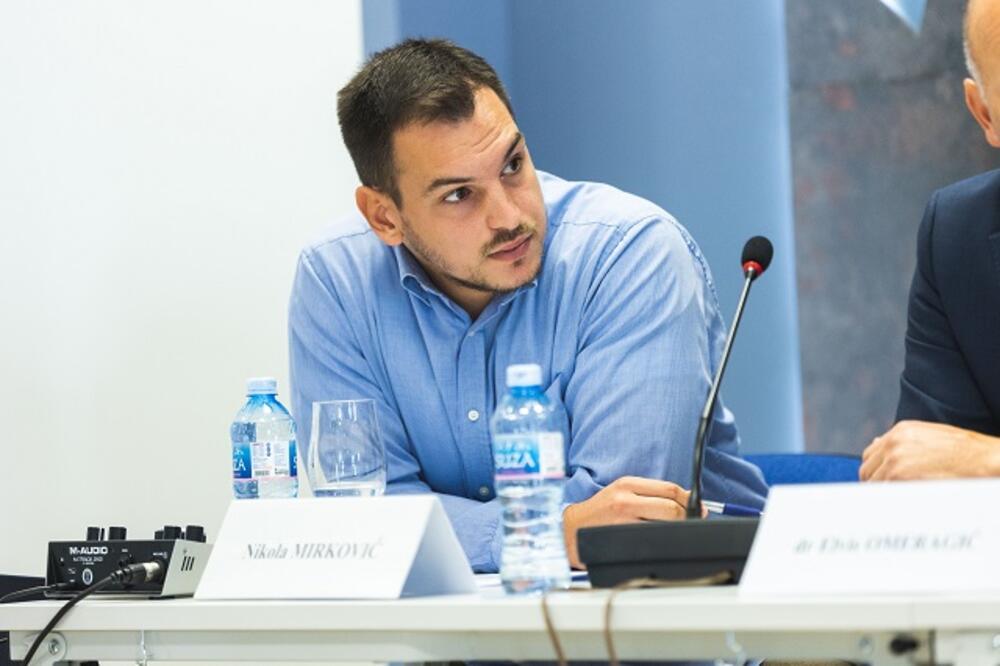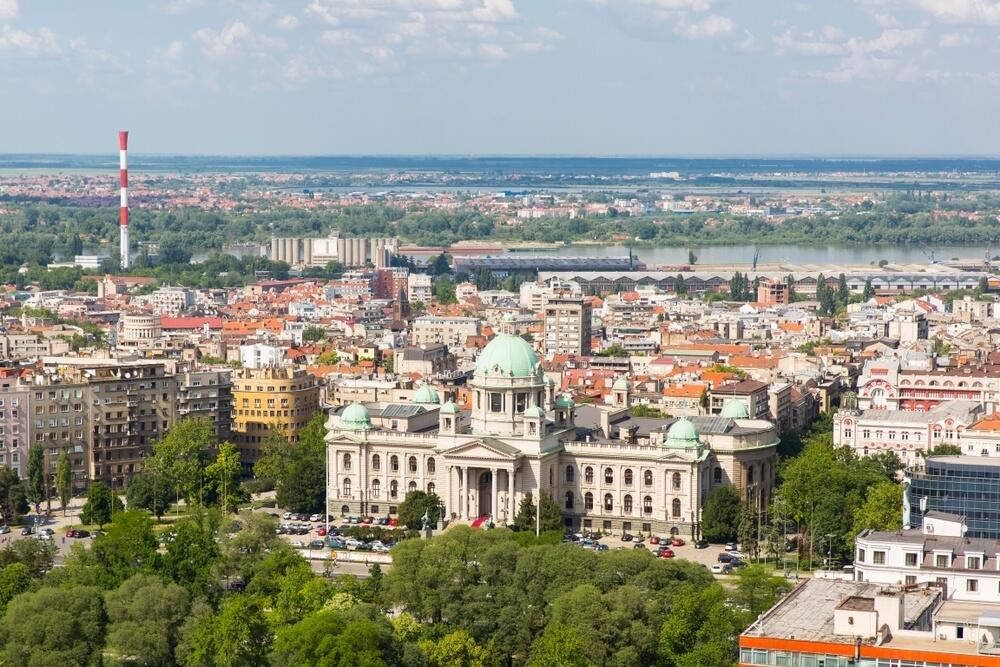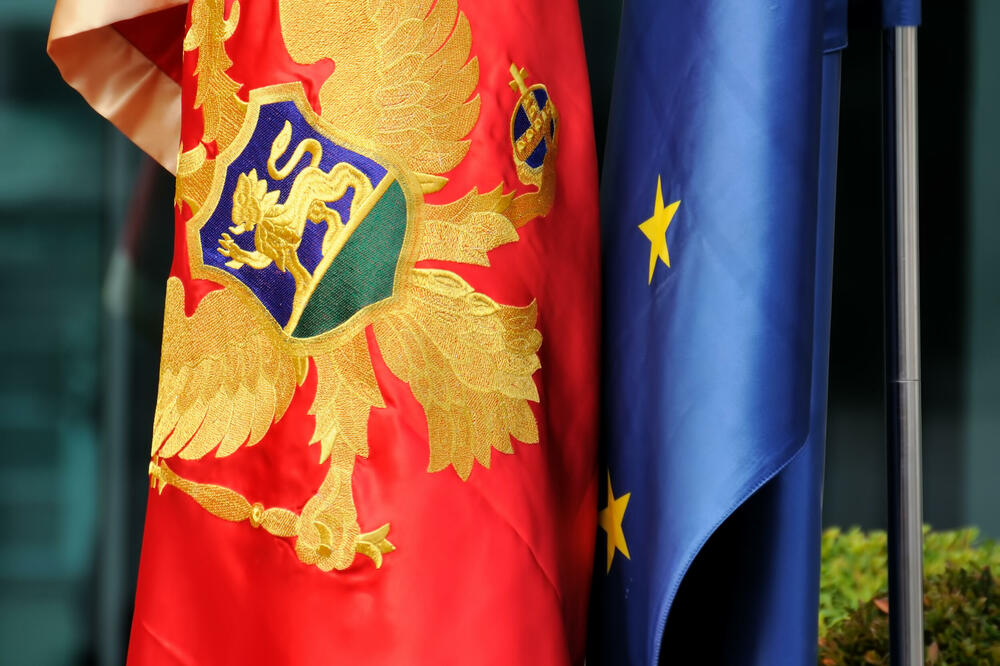Text: Željka Vučinić ("Vijesti"), Marko Čonjagić ("Danas"), Edin Barimac ("Oslobođenje")
The countries of the region expect great challenges in 2024 when it comes to the EU integration process, and the upcoming year represents a great chance for progress on that path.
When it comes to Montenegro, the challenges are primarily due to the large backlog that is the result of inaction and indifference of the previous governments, a program associate at the Center for Civic Education (CGO) assessed for "Vijesti". Nikola Mirkovic, commenting on what we can expect this year in terms of progress towards the EU.
"Therefore, a strong impulse is necessary in order to unblock the negotiation process and achieve the necessary dynamics in achieving measurable results as soon as possible, which would lead to obtaining final benchmarks in key chapters 23 and 24 and possibly temporarily closing part of other chapters," said Mirković.
He reminded that one issue was resolved at the end of 2023 - the chief negotiator was appointed, after more than 390 days that Montenegro was without him, "which is an unacceptably long time for a country where decision-makers emphasize that their priority is membership in the EU".
"We will see how he will manage in that position, that is, how much he will manage institutionally and organizationally to coordinate the process, especially considering the complexity of the system".
At the end of the year, the members of the Judicial Council were elected, before that the composition of the Constitutional Court was completed, so the election of the Supreme State Prosecutor (VDT) and the President of the Supreme Court remained.
Mirković assessed that the first key challenge this year is to prove to Brussels through concrete moves that there is a true political will to implement reforms in accordance with the legal acquis and best practices in the EU.
"Here we come to the second key challenge, which is the temporary benchmarks for key chapters 23 and 24, a total of 83 for these two chapters, which must be a priority in order to get the final benchmarks for those chapters, which is also a prerequisite for temporarily closing other chapters , because that part is practically blocked now due to the deadlock in chapters 23 and 24".
He pointed out that there are also important and neglected obligations in many other chapters, so the Government, but also other competent institutions, have a huge job to do, depending on whose direct responsibility it is.
Mirković emphasized that the third key challenge is the withdrawal of funds from EU funds:
"In the last period, we witnessed that these funds were lost due to poor capacities, and Montenegro does not have the luxury of losing grants that can help it, for example, in the implementation of important infrastructure and other projects that would directly affect the quality of life of citizens. The least that is expected now is that the same mistakes are not made, and that the new Government withdraws as many funds as possible from EU funds through better work of the state administration."

As he said, Brussels will give some time to the Government to show itself, but will not ignore the absence of concrete results or the violation of the assumed obligations. He assessed that this part is a test for the new authorities and how it will be handled during the re-voting in the Parliament on the Law on Amendments to the Law on Electronic Communications, which the president Jakov Milatovic returned, and the shortcomings of which were pointed out by the EU Delegation in a very well-argued manner. Mirković said that the amendments proposed by the Democrats, and supported by the ruling parliamentary majority, are not in accordance with EU regulations in that area and that it would not be a good message to stubbornly stick to it, as this will also jeopardize the public interest. which is reflected in the road to the EU.
"In the best case, if a sincere will to dynamize the EU integration process is shown and proven, which implies consistent respect for the rule of law, qualitative strengthening of the administration's capacity and not quantitative party staffing, with concrete results through the fulfillment of the set benchmarks, it could be expected that "Montenegro ends the year with an intergovernmental conference where we will receive the final benchmarks for Chapters 23 and 24, temporarily close a number of chapters and become a real favorite among the countries of the Western Balkans for the first next member of the European Union," said Mirković.
Balkan countries in different stages, some paths intertwined
Speaking about what the countries of the region can expect, Mirković said that the countries of the Western Balkans are in different stages of negotiations for EU membership, although some of the paths are intertwined.
"This refers to Serbia and Kosovo, where the latest messages from Brussels remind again that the EU expects that in 2024, Kosovo and Serbia will apply the obligations assumed from the agreement on the normalization of relations. It is clear that the paths towards the EU of these two countries are mutually conditioned, and will speed it up if they adhere to the signed agreements and declarations".
He said that, separately, apart from the issue of interstate relations with Kosovo, Serbia's progress towards the EU also depends on harmonization with the EU's foreign and security policy, i.e. on the introduction of sanctions against Russia and the prevention of circumvention of the restrictive measures introduced by the EU, and what Serbia, as the only country in the Western Balkans that did not.
"Also, numerous problems in the area of the rule of law in Serbia are evident, which is now being followed by controversies following the last election process, pressures on the civil sector, media that are critically oriented, etc. We should not ignore the questionability of the essential political will of the government in Serbia to be part of the EU, which is reflected in the attitude of Serbian citizens towards the EU, as shown by various public opinion surveys. In addition, Russia's aggression against Ukraine reveals Serbia's clearer support for Russia, as well as good political and economic relations with China, which all indicates that today Serbia seems to be more oriented towards the East than the West".
Mirković said that Kosovo started the year with visa liberalization, so from January 1, 2024, citizens can travel without visas to 27 countries of the Schengen area.
"The next big goal is to obtain the status of a candidate, and it is to be expected that Kosovo will additionally insist on this after the opening of negotiations with Ukraine and Moldova".
In the case of BiH, Mirković assessed that the opening of accession negotiations is still pending, and the messages from Brussels are clear that this will change only when the necessary level of compliance with membership criteria is met.
"Already in March 2024, the European Commission will report to the European Council on progress. It is well known that the situation with the Republika Srpska represents a significant obstacle to the process of EU integration in BiH, as well as the failure to comply with the judgments of the European Court of Human Rights, etc., and these are all issues which will not be solved quickly and easily, but some steps forward would help".
He said that the EU was unfair to North Macedonia in the earlier period, because that country deserved faster dynamics, and the constant issues posed by its neighbors who are in the EU are a big burden for it:
"Parliamentary elections in North Macedonia will be held soon, and we will see what the relationship between political forces will be and what this will mean for its European path."
When it comes to Albania, Mirković notes that the EU officially opened negotiations with Albania in 2022, but there are numerous challenges in the rule of law, primarily in the areas of judicial system reform, public administration and the fight against corruption.
"The last messages that Albania received from Brussels, at the end of 2023, sounded encouraging, and the holding of the meeting of the Berlin Process in Tirana was also a good sign. However, it remains to be seen how much Greece, with which Albania now has an open issue due to arrests of politicians of Greek origin in Albania, make Albania's path to the EU more difficult".
Serbia: Collapse of Democracy
At the beginning of November last year, the European Commission adopted the Growth Plan for the Western Balkans (2024-2027), worth six billion euros, which foresees that each government of the Western Balkan six receives a certain amount of money every six months, depending on the reforms it has implemented. In the case of Serbia and Kosovo, there is also a precondition that each of the parties must fulfill the obligations assumed in the dialogue in order to "qualify" for receiving money from the Growth Plan in case they implement reforms.
Milan Antonijevic, a lawyer and expert in European integration, tells "Danas" that the document is a clear message from Brussels about how it sees the improvement of the economic part of our region and how they want to contribute to the fact that economically "we can be part of the common market".
"That document clearly talks about directions, about priorities, and I think that it really unlocks a lot of areas that were somehow neglected - it also talks about critical raw materials, and about what is currently not discussed in Serbia, which is sustainable mining, the part that concerns environmental protection and the like", says "Danasov" interlocutor.

Antonijević points out that the year 2024 is a great chance for the countries of the Western Balkans, but that the Government of Serbia also has a great responsibility if it does not take advantage of that chance.
"In this year, political will must be seen. If we are fooled by things that only waste and swallow days and weeks of political life that are beyond the world and beyond Europe, then we will miss that chance," says Antonijević.
He adds that this year "the hand of the Western Balkans is on the open door".
"Whether we will close them together or open them wide is a question for the future Government of Serbia, and for those governments that have been elected in the Western Balkans," emphasizes Antonijević.
According to him, the question is whether the governments in this area will have enough concentration and political will to "bring some processes to an end". As he says, the first place is the rule of law, that is, chapters 23 and 24, which, he points out, Serbia has not fully resolved.
"Two more laws must be passed and with that you will have that zero point where the laws and by-laws have been passed. Then from there we can measure whether any progress has been made - whether we have any trials for corruption or we continue to turn a blind eye to everyone a criminal offense when it comes to a politically sensitive issue," says Antonijević and points out that things will be measured by Europe.
He explains that the appeasement of regional tensions is also of great importance.
"If we don't stop 'putting a finger in the eye' of each of our neighbors, which we see from Belgrade, Pristina and Sarajevo, nobody in Europe will take us seriously," notes Antonijević.
There is a more pessimistic view Jelica Minic, president of the European Movement in Serbia, who tells our paper that this year we can expect further collapse of democracy.
"We can expect a further increase in NATO troops in Kosovo and Bosnia and Herzegovina, a further collapse of democracy in most of the countries of the region, possible reckless moves by Serbia due to the ever-narrowing space for the game of 'talking one thing, doing the other', sitting on a tripod on which some legs are slipping away", says Minic.
She reminds that in the last year, each of the members of the Western Balkan six had some success.
"Serbia boasted of high foreign investments. In Montenegro, a government was formed and a population census was conducted. In Albania, the summit of the Berlin process was held and the opening of a branch of the European College, an elite European higher education institution, was announced. Albania and North Macedonia diligently entered into pre-accession negotiations with the EU. In Kosovo, after very turbulent events on the verge of an armed conflict with Serbia, the implementation of the Franco-German agreement according to the implementation plan from Ohrid began. Bosnia and Herzegovina is frozen in its seemingly intractable ethnic and institutional labyrinths and tensions," Minić reminds and adds that , overall, mutual relations in 2023 worsened.
Our interlocutor points out that the Open Balkans "quietly ceased to exist", and that Serbia began to express its pretensions towards BiH and Montenegro more and more openly. In addition, Minić continues, one gets the impression that Russia's activity in the region has intensified, especially in Serbia and Republika Srpska, which was especially felt during the parliamentary and local elections in Serbia, where, as she assessed, electoral theft was undisguised, brutal and with the application of an additional Russian skill.
However, Minic and Antonijević agree that it is necessary for Serbia to strengthen "Western" values.
"Strengthening democracy and freedom of expression, fighting against organized crime and corruption, clearly turning towards the EU and NATO in the state of war that is flaring up all over the planet and improving seriously deteriorated or shaken relations with all neighbors. Serbia in chaos is dangerous for all interested actors (even and Russia), and especially for its citizens," Minić concludes.
BiH: Vučić and Dodik are not the only ones Putin is counting on
Most citizens entered 2024 with new hopes and optimism. However, when living in the Western Balkans, it is difficult to predict exactly what the year will bring. Some would say that we are not even capable of predicting the weather forecast for more than seven days, let alone predicting the social and political processes that are taking place.
Adnan Ćerimagić, senior analyst of the European Stability Initiative (ESI), points out that what is very clear at the moment is that from the perspective of Brussels, a positive development is expected.
"With that narrative about returning the enlargement policy and the need to speed up enlargement to the countries of the Western Balkans, from the perspective of Brussels, what they are hoping for is that at least Montenegro, or potentially North Macedonia and Albania, will take a faster path towards the EU. While the other three countries will , that is, all six, this new plan for growth will encourage reforms that will be expected in return for the money," says Ćerimagić.
When it comes to Kosovo and Serbia, Ćerimagić recalls the announcements of the special representative Miroslav Lajčak that a lot of things should happen in the first half of this year, and that a stage should be reached where the elections for the European Parliament, the new European Commission, several national elections in the EU and the American elections will not have an impact on the relations between Kosovo and Serbia.
"When it comes to Bosnia and Herzegovina, Brussels expects reforms related to the opening of negotiations to be carried out and then potentially to prepare for the opening of negotiations. Of course, from the perspective of the Western Balkans and those of us who observe the region, these are rather rosy views. First of all, because we know that the relations between Kosovo and Serbia, despite some indications, are not actually on an upward trajectory. The situation in Serbia after the elections is quite demanding and it is still not known how it will develop further. In Bosnia and Herzegovina we have a ruling coalition from Republika Srpska, which announced additional measures that will complicate relations not only in Bosnia and Herzegovina, but also the relations of the international community with Banja Luka. A country where there is a possibility that the president (Donald) Tramp return, this means that all of this can have a negative impact on the situation in the Western Balkans," Ćerimagić warns.
Former BiH a diplomat Draško Acimović referring to the security aspect, he emphasizes that the war in Ukraine is spreading and warns that this will affect the Western Balkans as well.
"We are already seeing the first reactions related to certain moves by politicians who are acting quite differently now than they did before this war. They feel more confident that they can immediately enter the processes they want," said Aćimović.
He also points out that there are still five months left until the elections for the European Parliament and the European Commission, and that the outgoing administration, in its desire to show that they have achieved some results, is trying to show all the powers of the Western Balkan countries as something positive.
"Unfortunately, we are witnessing that the European path has been completely stopped in almost all countries of the Western Balkans. The only thing BiH or the Western Balkans can use to start something is this period when they need some positive news, because according to all current research, we are expecting a new configuration that will probably consist of conservative and radical parties at the EU level, which are against enlargement or are slowing it down," says Aćimović.
Political analyst from Croatia Davor Djenero believes that "before the elections for new European institutions, the management capacities of the EC are clearly reduced", and that "the American democratic administration, which is facing elections at the end of the year, no longer has the capacity for large projects, in fact it is increasingly difficult to deal with crises in Ukraine or Israel".
"The totalitarian regime is trying to take advantage of that in the Balkans Vladimir Putin, who successfully opened the crisis in Israel last year, in order to reduce the pressure of the West on him due to the invasion of Ukraine. The Balkans is one of the cards in his deck, and (Milorad) Dodik and (Aleksandar) Vucic are his pawns. Europe and America are burying their heads in the sand in order not to see it, and Vučić and Dodik are not the only ones that Putin is counting on as partners in destabilizing this area. It is certain that today's Croatian president does not even think of using the clear rhetoric he used 14 years ago Stipe Mesic, and he is not the only one on whom Putin counts as support in relieving pressure on Russia's pathogenic influence in the Balkans".
Bonus video:





